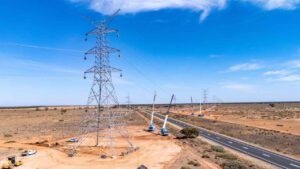The Australia government is going to come under increasing global pressure in the coming year to boost its climate targets, even as it seeks to base its energy policy around the assumption that emission reductions should cease after 2030.
At the Bonn climate talks which concluded last weekend, progress was made in putting together the rules that will underpin the Paris climate deal when it comes into effect from 2020.
But one of the most significant developments was the creation of a “2018 Talanoa dialogue” that will put pressure on major economies to upgrade their climate commitments to ensure that the long-term Paris target of limiting global warming “well below” 2°C is adhered to.
By this time next year, countries will be expected to have finalised the rules for implementing the Paris accord, and to commit to enhance their national climate plans by 2020. They had probably thought that they could get away with no upgrades until around 2025.
“The planet is at a crossroads,” says the former Peru environment minister Manuel Pulgar-Vidal, who is now Head of WWF’s Global Climate and Energy Programme.
“We have within our reach an unprecedented opportunity following the Paris Agreement – one that can and must change the future. The decisions we make today set the foundation for 2018 and beyond. Countries must increase their ambition to put us on a path to a 1.5°C future.”
“In order for governments to have confidence in strengthening their climate targets in 2020, they need to see that exceeding their current targets is urgent, achievable, and desirable,” he says.
And this is where we see the Talanoa Dialogue playing a role. It will allow countries to better understand that businesses, cities, and communities around the world are stepping up ahead of them.
“They will understand that their national climate plans have been surpassed by the real economy and its time to catch up.”
Most are pointing to the falling cost of renewables as the principal vehicle to achieve these goals, along with a greater focus on energy efficiency; and 11 countries – albeit those with little coal power in the first place – have vowed to exit coal by 2025, led by England and Canada.
“Governments should not hide behind those who do not want to make progress,” said Sharan Burrow, the former head of the ACTU and now general secretary of the International Trade Union Confederation .
“They put at risk the benefits of investments in jobs and economic growth and they put at risk the planet.”
Australia, however, will be one of those under pressure. Already, it has been criticised after a UNEP report suggested its own modest targets would not be met. And it is not shying away from its support of coal.
At Bonn, Australia was simultaneously derided by environmental groups for its support for the Adani coal mine, and applauded by US coal giant Peabody for giving coal a boost through its proposed National Energy Guarantee.
Energy minister Josh Frydenberg, who attended the last few days of the negotiations for ministerial talks, says coal still remains a critical part of Australia’s energy mix.
And while most others – including even the conservative International Energy Agency – were marvelling at the fall in renewable energy and storage costs, and some were hailing how 100 per cent renewables would be cheaper than business as usual, Australia looks determined to look the other way, and put a lid on wind and solar.
The proposed NEG assumes no or little renewable energy will be installed between 2020 and 2030, and the Energy Security Board has been instructed by Canberra to design a policy assuming only a 26 per cent cut in energy sector emissions by 2030, and no further cuts after that time.
Prime Minister Malcolm Turnbull, meanwhile, has flown to Queensland to voice his support for that state’s LNP, which proposes to remove all incentives for renewable energy, scrap the state’s 50 per cent renewable energy target and build a new coal-fired power station near Townsville.
It is a position that is widely regarded as completely untenable and reflective only of an administration that either does not accept the climate science, or refuses to do something about it.
“When you deny climate action, you deny your citizens cleaner, cheaper energy, said Marcelo Mena Carrasco, environment minister of Chile, which recently set a new record low for the price of solar PV (until it was beaten by Mexico).
“Since we’ve introduced carbon taxes, and begun to change our energy system, we’ve seen the renewable energy sector grow fivefold,” he said.
“And while we projected renewable energy from solar and wind to be 20 percent of our energy sources by 2025, we reached this goal last month –eight years early.
“Our NDC (Paris climate commitment) was written in 2013 and is already outdated. So I think for the future, to enhance ambition, we need to have very flexible action plans so we can capture the low-carbon transformation as it happens.”
That’s not what Australia’s conservatives have in mind. Ironically, the next climate talks will be held in Silesia, known as coal heartland of Poland, Europe’s most brazenly pro-coal country.








